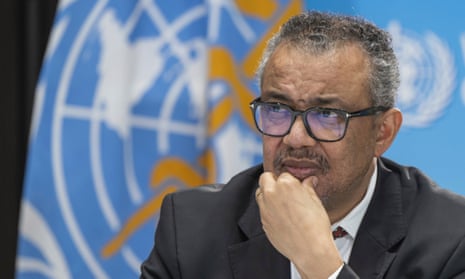Global pandemic agreement at risk of falling apart, WHO warns
The accord, aimed at preventing another health catastrophe, is losing momentum due to ‘lies and conspiracy theories’

Plans for a global pandemic preparedness agreement risk falling apart amid wrangling and disinformation, according to the chief of the World Health Organization, who has warned that future generations “may not forgive us”.
Shaken by the Covid-19 pandemic, the WHO’s 194 member states decided more than two years ago to start negotiating an international accord aimed at ensuring countries are better equipped to deal with the next health catastrophe, or to prevent it altogether.
The plan was to seal the agreement at the 2024 World Health Assembly, the WHO’s decision-making body, which convenes on 27 May.
However, Tedros Adhanom Ghebreyesus, the WHO’s director-general, said the momentum had been slowed down by entrenched positions and “a torrent of fake news, lies, and conspiracy theories”.
He warned that if nobody was prepared to seize the initiative or give ground, the whole project risked going nowhere.
Tedros told the WHO’s executive board in Geneva on Monday: “Time is very short. And there are several outstanding issues that remain to be resolved.”
Failure to strike an agreement would be “a missed opportunity for which future generations may not forgive us”, he said.
Tedros said all countries needed the capacity to detect and share pathogens presenting a risk, and timely access to tests, treatments and vaccines.
He called for a “strong agreement that will help to protect our children and grandchildren from future pandemics”.
Tedros said claims that the accord would cede sovereignty to the WHO or give it the power to impose lockdowns and vaccine mandates were “completely false”.
“We cannot allow this historic agreement, this milestone in global health, to be sabotaged.”
WHO member states decided in December 2021 to create a new international instrument on pandemic prevention, preparedness and response, aimed at ensuring the flaws that turned Covid-19 into a global crisis could never happen again.
The WHO emergencies director, Michael Ryan, reminded countries how the pandemic “ripped apart our social, economic and political systems and became a multi-trillion dollar problem”.
In the midst of major geopolitical conflicts, “this is one thing the world agrees on”, he said.
Roland Driece, who is co-chairing the negotiations, said the project had condensed a seven-year process into two years.
He said the accord should be ambitious, innovative and with clear commitments.
On the disagreements, he said European countries wanted more money invested in pandemic prevention, while Africa wanted the knowledge and financing to make that work, plus proper access to pandemic “countermeasures” such as vaccines and treatments.
He said there were two sessions of two weeks left to do an “extreme” amount of work.
Parallel negotiations are also going on to reform the international health regulations (IHR), which many countries felt had been found badly wanting.
Under these, Tedros declared Covid-19 a public health emergency of international concern on 30 January 2020 – the highest level of alert available under the regulations.
But it was not until March 2020 when he described the worsening situation as a pandemic – a word that does not exist in the IHR vocabulary – that the world jolted into action, by which time the virus was already widespread.
Tedros declared an end to the international emergency in May 2023.
Ashley Bloomfield, the chief executive of New Zealand’s health ministry during the pandemic, is co-chairing the IHR negotiations.
Like Tedros, he criticised a “coordinated and sophisticated campaign” of misinformation and disinformation attempting to undermine the process.
He said there were 300 proposed amendments to plough through during the talks.


No comments:
Post a Comment